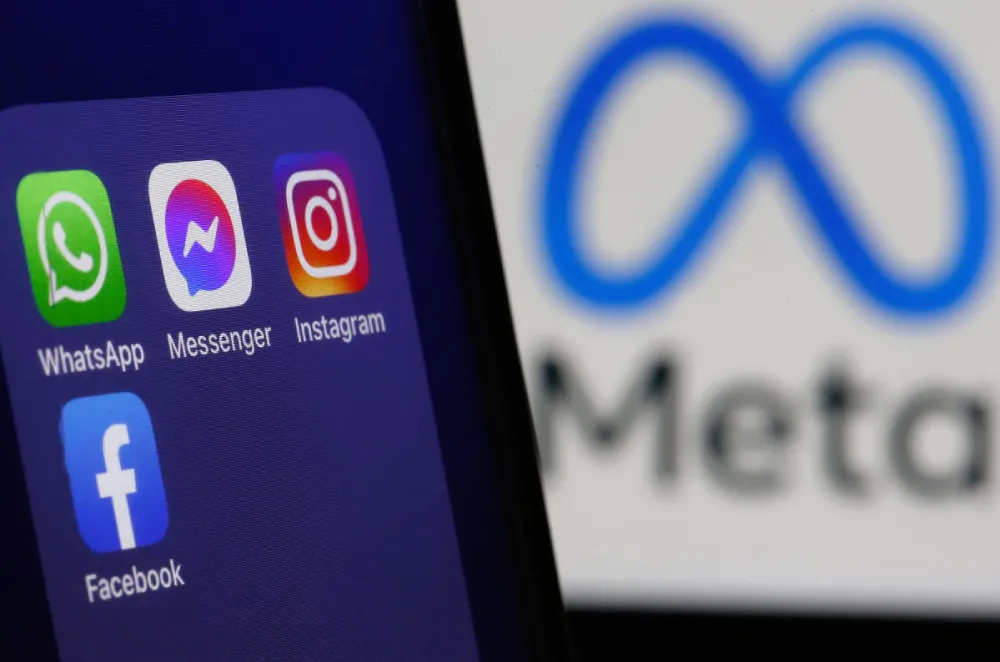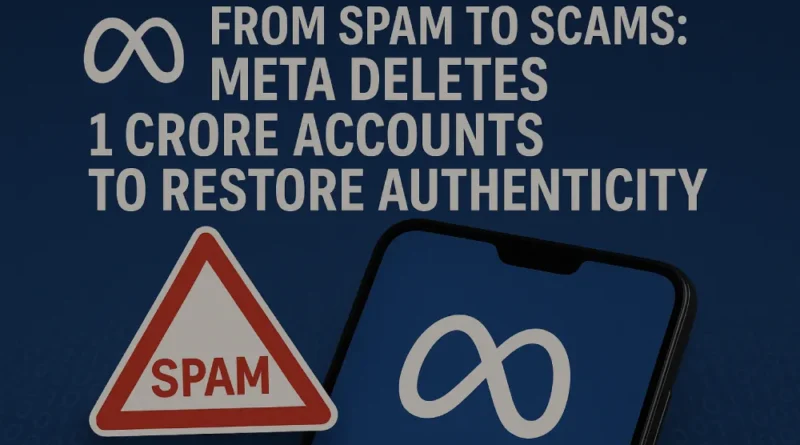From Spam to Scams: Meta Deletes 1 Crore Accounts to Restore Authenticity
Introduction
Meta, the parent company of Facebook made an ambitious attempt to re-gain the trust and profile authenticity of its platform when it announced on July 15, 2025, that it had shut down around 1 crore (10 million) accounts in the first half of 2025, due to spammy behavior, impersonation and content frauds. To add on to this, the company disabled 5 lakh (500,000) accounts associated with fake engagement or spam approaches by either demoting their postings or employing fines. This mass purge is only one of the elements of the company-wide push to fight against the development of spam and a lack of original content that is generated by the use of AI, and is supposed to raise the level of authentic creators and the user experience. This paper discusses why Meta is doing such things, how it has affected the platform and what this entails to the users and creators, including peculiarity, local understanding, and reliable sources so that the reading audience can derive value out of them.
Background: The Rise of Spam and Scams on Social Media
Facebook and other social media have fought this war against spam and fake accounts on content fraud and artificial intelligence intensifies this issue. Over the last few years, rogue users have used AI to build strong impersonator accounts, repackage viral material without attribution, and use platform algorithms as a source of revenue. By serving to diminish the presence of legitimate creators not only in the field of battle, but also the trust that users have in the feeds, these tactics serve to undermine their specific desired communities. Meta 2025 crackdown is just one more step like YouTube, which recently introduced stricter policies against inauthentic content or repetitive content, indicating that the industry has a general tendency regarding authenticity.
As stated in a blog post published by Meta on July 15, 2025, the company is focused on providing Facebook feeds with improved relevance and authenticity. The accounts that were targeted by the company included those with most activities of content recycling, going in the place of popular creators, and fake engagement campaigns. The project is consistent with the overarching Meta goal of valuing original creators and minimizing what the company calls digital noise when the use of AI in generating content is rising.
The Crackdown: What Meta Did and Why
Scope of the Action
Meta’s enforcement actions in the first half of 2025 were staggering:
- 10 Million Accounts Removed: This was mostly the fraudulent accounts which were impersonator profiles imitating a top creator or even using AI based sparking up activities. According to CNBC and News18, many took advantage because they could easily create echoes of credible voices through the algorithm in the process of gaining traction using Facebook.
- Penalty to 5 Lakh Accounts: According to Twitter, 500,000 accounts were penalized including demotion of the content posted by those accounts up to fines in case of spam activities, including a large number of hashtags added into the content or making use of fake activity applications. These are some of the ways that look to ensure that such accounts cannot commercially gain through the content.
Reasons for the Crackdown
Meta’s actions were driven by several factors:
- 1. Protecting Real producers: Plagiarism and content theft hurt real producers by limiting their audience and income. According to Meta's blog post, their new rules give more weight to "authentic storytelling" and original material.
- 2. Combating AI-Generated Spam: The rise of AI tools has made it easier to produce low-quality, recycled content at scale. Meta's attack is aimed at this "AI slop" that fills up feeds and makes the user experience worse.
- 3. Improving User Trust: Scams and fake accounts, like ones that pretend to be famous people, cause misunderstanding and hurt trust. Meta wants to rebuild trust in the site by getting rid of these accounts.
- 4. Aligning with Industry Trends: Following YouTube’s recent policy changes, Meta’s actions reflect a broader industry effort to combat unoriginal content and reward genuine creators, as reported by The Times of India.

Unique Insights: Implications for Creators and Users
1. A Boost for Authentic Creators
The crackdown on Meta is a victory to the creators who work hard and spend time to create original works. Meta removes reposting without a credit, which demotes or deletes the accounts that repost without credit to receive visibility of the authentic voices. The startup also experiments with the tools that allow them to track reposted content back to the creator, so that they get credited. It is of great importance to small-scale creators who are not able to use advertising and have to count on organic reach to create an audience.
Local Context (India): In India, the industry of content development is on an upswing, however in the local languages, such as Hindi, Tamil, and Gujarati, the move by Meta might be a big enabling factor to the local creators. Social media, such as Facebook, will be crucial to the Indian influencer since there will be more than 500 million users in the nation by 2025 (Statista). The duplication of work is however common and has been an irritant to creators particularly on viral meme pages. Tweets on X by Indian users including @TNNavbharat express interest in the move by Meta but add that it is only one step towards the equality of regional content creators.
2. Challenges for Casual Creators
Even though the crackdown targets malicious practitioners, those with recreational goals that recycle contents and make minor remodelling will be de-prioritised. Meta has further clarified that reaction video or the comments based video will be okay but they will not consider it substantial editing by merely splicing and stitching or plastering a watermark on the video. This can impact the creators even in such markets like India, where meme pages and fan accounts often take over viral posts. One of the recommendations that Meta offers a priority in the original storytelling, low rates of hashtags, and the quality of the caption could be applied as a guideline in adhering to the new rules.
3. The AI Content Conundrum
This has been a special challenge because of the emergence of AI generated content. Although there is a chance that AI can democratize content creation, it provides the spam networks with an opportunity to clog the platforms with low-value posts. The fact that Meta is paying particular attention to what Moneycontrol describes as such spammish content produced by AI tools implies a protracted arms race with algorithm-gaming content mills. This may force them to put money in more distinctive, anthropocentric storytelling.
4. User Experience and Platform Integrity
To the ordinary users, the crackdown guarantees clean feeds without a lot of spam and sham records. But the slow implementation of these changes, which Meta focused on, is the reason that these changes will hardly impact the real users. This step may help improve safety in India and other countries where fraud schemes (phishing, false competitions to win a prize, and so on) on social media are a widespread problem, especially concerning rural users who tend to be less technologically aware.
Local Context: India’s Social Media Landscape
As the world has a 1.4 billion population and a fast-growing digital environment, India should be among the main markets of Facebook. With over 500 million users, the ground is considered the place where even scammers can collaborate with content creators and small businesses. In India, where counterfeit profiles traditionally use regional popular phenomena, including Bollywood or cricket-related posts, to become popular, the idea of banning 1 crore accounts is very topical. This would usually affect those accounts operating someone else’s profile who do it in secret and local newsletters reported several such accounts are getting targeted by the action by Meta as reported in AajTak and Navbharat Times.
Besides, Meta fines to 5 lakh accounts indicate that it will take a more rigid attitude towards monetization schemes. This can discourage spam-driven monetization of creators in India (e.g. in-stream ads), where platforms such as Facebook are now a primary revenue mechanism. This focus on real storytelling is consistent with the creative economy in India, in which creators such as CarryMinati, and local YouTubers, exploit their own narrative origins.
Opportunities and Challenges
Opportunities
- Supporting Creators: Meta also levels the playing field even by getting rid of fake engagement, which supports genuine creators, particularly in their markets and regions, such as India where regional content is exploding.
- Improved User Experience: User experience will be enhanced due to cleaner feeds leading to better user engagement as well as by the advertisers.
- Innovative Content Creation: Meta advice is to help innovators concentrate on the stories and imaginative editing, as the creator.
Challenges
- Adaptation of Creators: More stringent rules will need to be adjusted by casual creators, which means they might have to put more effort into creating original content.
- Consistent threat of AI: Since the AI tools evolve rather quickly, Meta should always keep updating its detection systems so that spammers are always caught behind by Meta.
- Striking the Enforcement Balance: Meta does not want to punish good users in a bid to crack down on bad actors which are harder to track in a platform the size of theirs.
Conclusion
The move of Meta to delete 1 crore accounts and penalise 5 Lakh accounts will be the turning point towards regaining authenticity in Facebook. The focus on spam, scams, and impersonation should help the creators as well as intelligent user trust and fight the AI-generated content tidal wave. To Indian users and developers, this clampdown will help resolve local issues such as theft of content and frauds, developing a more equitable presence on the digital frontier. Instead of rushing into making such changes, Meta offers only to introduce them gradually, assuring creators to welcome the concept of original storytelling to succeed according to the new rules.
Disclaimer
The information presented in this blog is derived from publicly available sources for general use, including any cited references. While we strive to mention credible sources whenever possible, Web Techneeq – Web Development Company in Mumbai does not guarantee the accuracy of the information provided in any way. This article is intended solely for general informational purposes. It should be understood that it does not constitute legal advice and does not aim to serve as such. If any individual(s) make decisions based on the information in this article without verifying the facts, we explicitly reject any liability that may arise as a result. We recommend that readers seek separate guidance regarding any specific information provided here.

